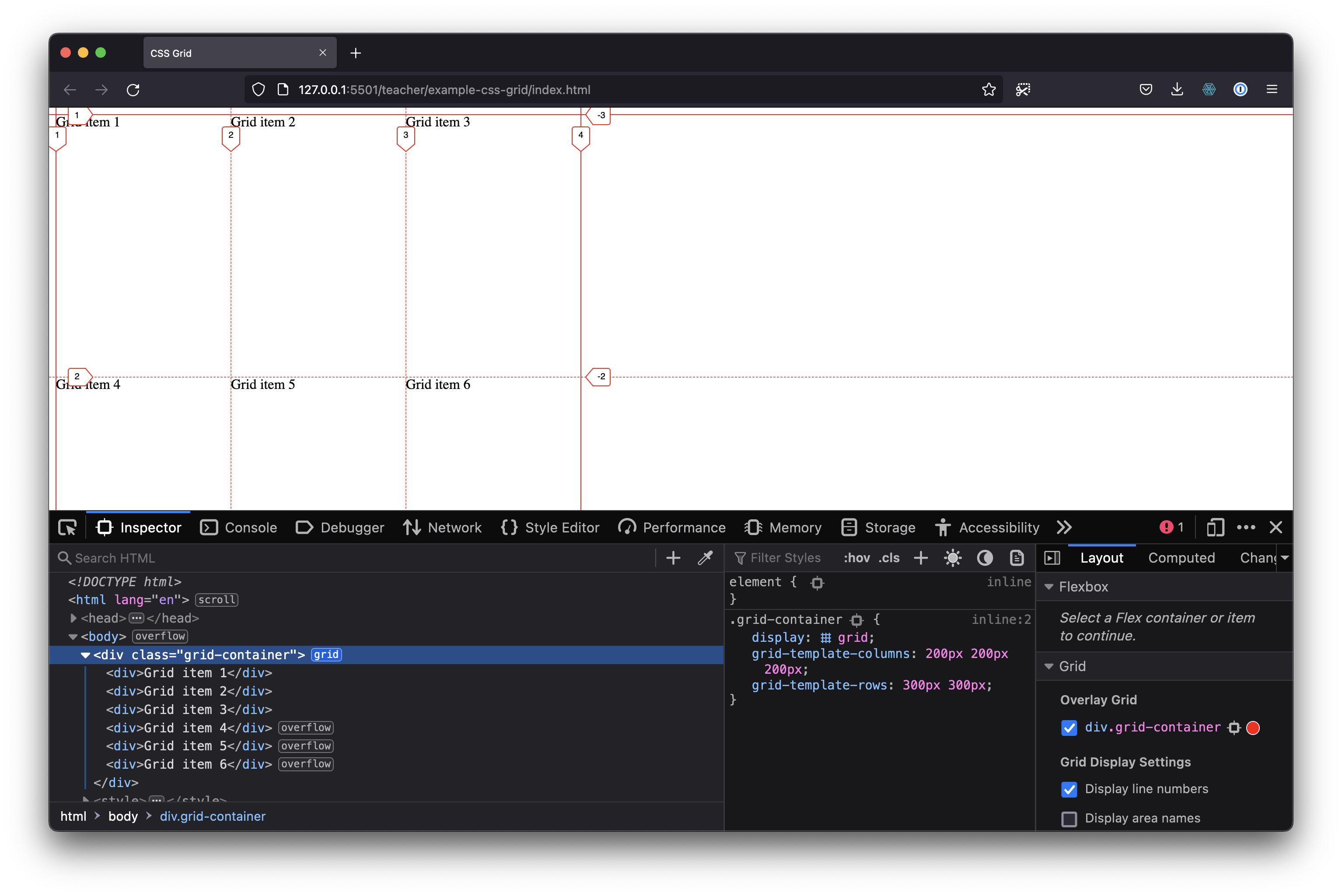Difference between revisions of "CSS Grid"
VKranendonk (talk | contribs) |
VKranendonk (talk | contribs) |
||
| Line 3: | Line 3: | ||
This article describes the basic concepts of CSS grid and links to resources with more info on CSS grid. | This article describes the basic concepts of CSS grid and links to resources with more info on CSS grid. | ||
CSS grid places its direct children onto a "grid". In the following HTML snippet | CSS grid places its direct children onto a "grid". In the following HTML snippet the parent element has the class 'grid-container' and 6 children. | ||
<source lang="html5"> | <source lang="html5"> | ||
| Line 16: | Line 16: | ||
</source> | </source> | ||
We first have to set the parent element to be displayed as a grid via CSS. | We first have to set the parent element to be displayed as a grid via the CSS property "display". | ||
<source lang="css"> | |||
<style> | |||
.grid-container { | |||
display: grid; | |||
} | |||
</style> | |||
</source> | |||
Now the code above will not show any difference in the browser. We also have to create columns and or rows. We can do this with the properties "grid-template-columns" and "grid-template-rows". | |||
<source lang="html5"> | <source lang="html5"> | ||
| Line 22: | Line 32: | ||
.grid-container { | .grid-container { | ||
display: grid; | display: grid; | ||
grid-template-columns: 200px 200px 200px; | |||
grid-template-rows: 300px 300px; | |||
} | } | ||
</style> | </style> | ||
</source> | </source> | ||
The following code creates a grid of 3 columns, each column 200px wide and 2 rows of 300px height. | The following code creates a grid of 3 columns, each column 200px wide and 2 rows of 300px height. | ||
Revision as of 08:25, 5 September 2022
With CSS there are multiple ways of positioning elements such as `position: absolute`, `display: flex` and `CSS Grid`. CSS grid is a really nice CSS property to position elements on a grid layout.
This article describes the basic concepts of CSS grid and links to resources with more info on CSS grid.
CSS grid places its direct children onto a "grid". In the following HTML snippet the parent element has the class 'grid-container' and 6 children.
<div class="grid-container">
<div>Grid item 1</div>
<div>Grid item 2</div>
<div>Grid item 3</div>
<div>Grid item 4</div>
<div>Grid item 5</div>
<div>Grid item 6</div>
</div>
We first have to set the parent element to be displayed as a grid via the CSS property "display".
<style>
.grid-container {
display: grid;
}
</style>
Now the code above will not show any difference in the browser. We also have to create columns and or rows. We can do this with the properties "grid-template-columns" and "grid-template-rows".
<style>
.grid-container {
display: grid;
grid-template-columns: 200px 200px 200px;
grid-template-rows: 300px 300px;
}
</style>
The following code creates a grid of 3 columns, each column 200px wide and 2 rows of 300px height.
<div class="grid-container">
<div>Grid item 1</div>
<div>Grid item 2</div>
<div>Grid item 3</div>
<div>Grid item 4</div>
<div>Grid item 5</div>
<div>Grid item 6</div>
</div>
<style>
.grid-container {
display: grid;
grid-template-columns: 200px 200px 200px;
grid-template-rows: 300px 300px;
}
</style>
Resources
- CSS Grid course by Wes Bos is full-on in depth course on CSS Grid
- MDN Web Docs has a good introduction to CSS Grid
- CSS Grid Garden is a fun CSS grid game
- CSS Tricks has a good reference article on CSS Grid
